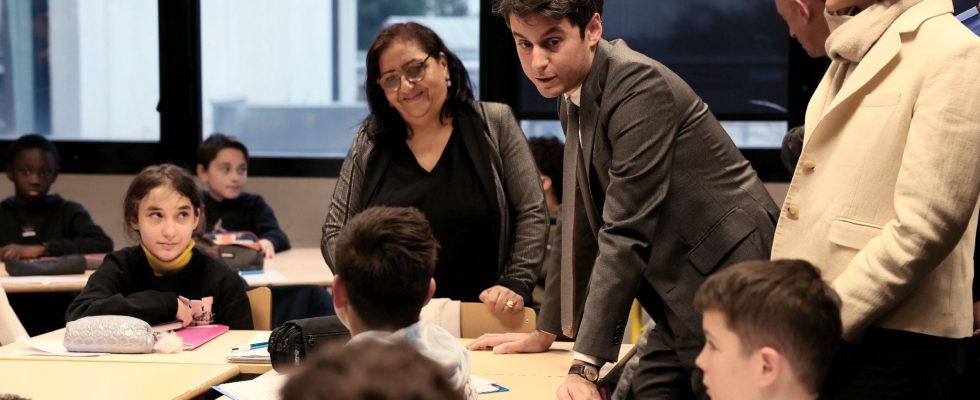Eight and a half years. This is the average age of first registration on a social network in France, according to a survey by the National Commission for Information Technology and Liberties (Cnil) carried out in 2021, with the freedoms and dangerous abuses that result from it. To address this observation, Gabriel Attal announced in an interview with Parisian this Sunday want to put in place a “digital lock” for the youngest, in particular wishing to better prevent the access of those under 13 to social networks. A “very difficult but not impossible project”, affirms the Prime Minister, who announced that he wanted to “work with the platforms” to also condition access for 13-15 year olds to parental agreement, rather than “taking binding decisions” at the state level.
If a law adopted and promulgated last July set a digital majority at 15 years and requires platforms to “put in place a technical solution” to apply new obligations (allowing parents to request the suspension of their child’s account, activate when registering a minor a system for monitoring the time spent online), the concrete implementation still remains unclear.
“I think there is a way to get there in collaboration with the platforms. Facebook, Twitter, TikTok and others are aware of the reputational stakes for them. They will play the game,” insists Gabriel Attal. To succeed in better controlling the use of social networks by young people, tools already exist. But they have their limits.
Age check
Already raised by the ban on minors’ access to pornographic sites, the question of controlling the age of users, and more generally digital identity, has already found technical answers. Some applications, such as the French social network Yubo, use the British company Yoti, which has developed an age assessment system based on a photo, based on artificial intelligence. But the deployment of these tools remains rare because, beyond their technical aspects, they must comply with legal requirements.
The National Commission for Information Technology and Liberties (Cnil) thus reports that age control leads “to the collection of personal data and presents risks to privacy”. In accordance with the European Data Protection Regulation (GDPR), tools such as facial recognition see their use very limited.
In addition, age restrictions, even imposed by the State, can be circumvented: in China, since 2021, those under 14 cannot spend more than 40 minutes per day on Douyin, the Chinese version of TikTok, and online gaming time for minors is limited. These restrictions are made possible by strict control of the age of users, because access to social networks and messaging applications can only be done with a valid telephone number, linked to an identity document. If there is any doubt about age, a passport photo can also be requested. But these limits only apply to connected media. Nothing prevents a child from playing on an unconnected device. Furthermore, parents can circumvent the ban by letting their children play using an adult identity number.
Limiting screen time
Limiting the time children spend on screens is also a government priority. At the initiative of President Emmanuel Macron, experts are working on the subject and their recommendations, expected in April, “could for example be grouped together in a guide to good use”, indicates Gabriel Attal.
In France, tools for limiting screen time for minors are already available on certain applications or phones, and are also listed on a government site. Parents can thus limit the time spent on the social networks Instagram or TikTok, set an online connection limit on iPhones or Nintendo consoles, or install a parental control application developed by Google, allowing them to restrict the overall time online. or by application. Meta, for its part, introduced a “Late notification” feature which appears “automatically” on the Instagram account of minor users when used between 10 p.m. and 4 a.m., to encourage them to close the application. Making the adoption of these tools mandatory would require placing this legal responsibility on the applications or parents.
“Technically, the State could ask applications to block access from a certain time,” Olivier Ertzscheid, lecturer in Information and Communication Sciences, told AFP in January. He added that the question would be more that of the legal basis and the social acceptability of such an obligation. “This type of measure would be unprecedented in a democratic European country.” Suffice to say that the work remains immense to succeed in widely applying such restrictions.
